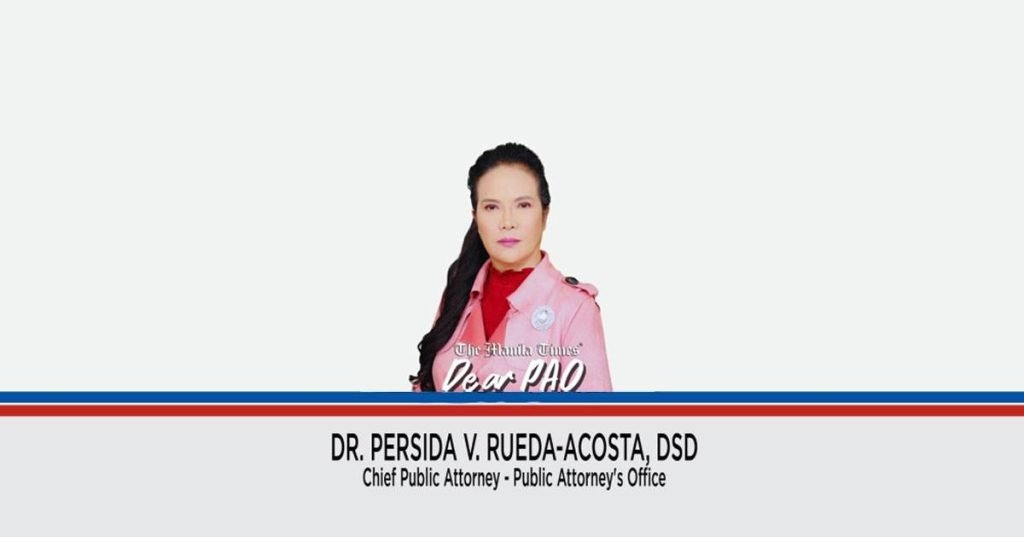
Dear PAO,
I am a private complainant in a criminal case which is still pending. One of my witnesses, who executed an affidavit, can no longer be located despite my earnest efforts to find him. What I know is that the affidavit of my witness, which was already submitted, can still be considered since it is a public document. However, a friend told me that the affidavit of my missing witness is useless as it is hearsay. I am worried that this may affect the outcome of the case. Is it true that the affidavit of my witness is hearsay?
Nestor
Dear Nestor,
Hearsay evidence was defined in Calicdan v. Cendaña, GR 155080, Feb. 5, 2004, which was penned by Associate Justice Consuelo Ynares-Santiago, as:
“[E]vidence not of what the witness knows himself but of what he has heard from others.” The hearsay rule bars the testimony of a witness who merely recites what someone else has told him, whether orally or in writing. In Sanvicente v. People, we held that when evidence is based on what was supposedly told the witness, the same is without any evidentiary weight for being patently hearsay. Familiar and fundamental is the rule that hearsay testimony is inadmissible as evidence.”
This kind of evidence is particularly governed by Section 37, Rule 130, of AM 19-08-15-SC dated Oct. 8, 2019, or the 2019 Amendments to the 1989 Revised Rules on Evidence, which provides:
“Hearsay is a statement other than one made by the declarant while testifying at a trial or hearing, offered to prove the truth of the facts asserted therein. A statement is (1) an oral or written assertion or (2) a non-verbal conduct of a person, if it is intended by him or her as an assertion. Hearsay evidence is inadmissible except as otherwise provided in these Rules.
“A statement is not hearsay if the declarant testifies at the trial or hearing and is subject to cross-examination concerning the statement, and the statement is (a) inconsistent with the declarant’s testimony, and was given under oath subject to the penalty of perjury at a trial, hearing, or other proceeding, or in a deposition; (b) consistent with the declarant’s testimony and is offered to rebut an express or implied charge against the declarant of recent fabrication or improper influence or motive; or (c) one of identification of a person made after perceiving him or her.”
Generally, the affiant’s statement, even when acknowledged before a notary public, is hearsay. The rationale behind this rule was fully explained in People of the Philippines v. Pimentel and Reyes, GR 251587-88, June 15, 2022, where the Supreme Court, speaking through Associate Justice Samuel Gaerlan, stated:
“Basic is the rule that, while affidavits may be considered as public documents if they are acknowledged before a notary public, these Affidavits are still classified as hearsay evidence. The reason for this rule is that they are not generally prepared by the affiant, but by another one who uses his or her own language in writing the affiant’s statements, parts of which may thus be either omitted or misunderstood by the one writing them. Moreover, the adverse party is deprived of the opportunity to cross-examine the affiants. For this reason, affidavits are generally rejected for being hearsay unless the affiants themselves are placed on the witness stand to testify thereon.”
Applying the aforecited jurisprudence in your situation, the affidavit of your witness who can no longer be located to testify in court will not be admitted in evidence because the same is hearsay for the simple reason that the adverse party will be deprived of the opportunity to cross-examine your witness if his affidavit will be presented as evidence.
We hope that we were able to answer your queries. Please be reminded that this advice is based solely on the facts you have narrated and our appreciation of the same. Our opinion may vary when other facts are changed or elaborated.
Editor’s note: Dear PAO is a daily column of the Public Attorney’s Office. Questions for Chief Acosta may be sent to [email protected].








